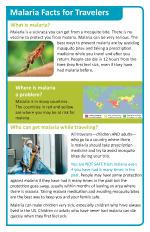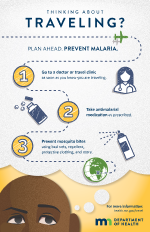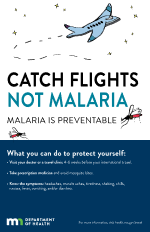Contact Info
About Malaria
Malaria is a mosquitoborne disease that is caused by a parasite (Plasmodium species). It is found in many countries including sub-Saharan Africa, South Asia, as well as Central and South America. If a person is bitten by an infected Anopheles mosquito, symptoms typically occur within 1-4 weeks. The most common symptoms include shaking, chills, high fever, headache, sweats, body aches, and tiredness. Severe complications and death may also occur if the infection is not treated promptly. While malaria is a serious illness that can be deadly, prevention methods are available. Before traveling, talk with your health care provider or visit a travel clinic to discuss your risk and ways you can protect yourself. While antimalarial medications are recommended to prevent severe illness, they can delay symptoms by weeks or months. Travelers who become ill with a fever or flu-like illness within a year of travel to an affected country should seek immediate medical care and always remind their health care providers about any travel. Rarely, people can get malaria through a blood transfusion or infants can get malaria before or during delivery if the mother is infected. Persons who have lived or traveled to areas where malaria is present are usually deferred from donating blood for 1-3 years.
Malaria information for travelers
Anyone who travels to a country where malaria occurs should take precautions against contracting the illness. Even if you were born in a country where malaria is present or if you have had malaria in the past, you may have lost any immunity that you might have had while living in that country. Please talk with your health care provider or visit a travel clinic so that you can take preventive medications and learn how to protect yourself from mosquito bites and other diseases spread by mosquitoes.
Print materials
Video: MN Malaria Stories
MN Malaria Stories: Importance of antimalarial medication
Richard Oni, PhD, Progressive Individual Resources Inc, shares his experience with malaria after traveling to visit friends and relatives back home in Nigeria.
- Transcript and short version: Importance of antimalarial medication
More information
- CDC: Malaria
Centers for Disease Control and Prevention general information about malaria.
- For more information on international travel, visit International Travel & Infectious Disease.




